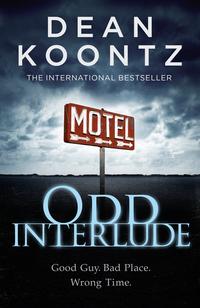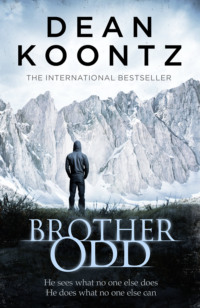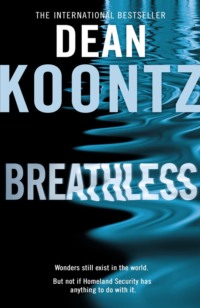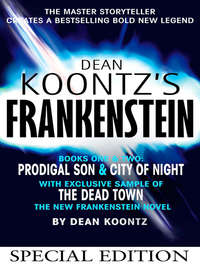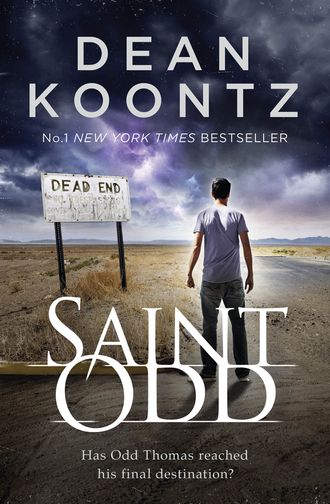
Полная версия
Saint Odd
“Who has her ashes?” the woman asked.
“I don’t know. Several possibilities.”
Their footsteps retreated from the ice-cream shop, and distance dimmed the lights they carried.
I came out of hiding, rose to my feet, and hurried to the gate at the end of the counter. Regardless of the risks, I needed to know more about those people.
Four
REVEALED ONLY AS SHADOWY FORMS WIELDING swords of light, the trio moved leisurely toward the north end of the mall, pausing to fence with the darkness and illuminate one point of interest or another.
I dared not switch on my flashlight. Their conversation gave me some cover, but if I followed blindly in their wake, I was likely to step on something that would make enough noise to attract their attention.
My dilemma was resolved when a hand laid on my shoulder made me turn my head, whereupon I came face-to-face with a softly glowing man who had no face. Eyeless sockets regarded me from a mask of bullet-torn flesh and shattered bone.
After so many years of supernatural experience, I was by then immune to the sudden fear that others would have experienced at the unexpected touch of a hand in the dark. Likewise, the hideous face—or the absence of one—inspired no fright, but instead sadness and pity.
I could assume only that here stood the spirit of Rob Norwich, who had died in the ice-cream shop almost two years earlier, the father of six-year-old Emily, who had also died. If the child had moved on from this world, her father had not.
Never before had a spirit appeared radiant to me, and I thought he manifested in this manner so that, by accompanying me, he might serve as a lamp to reveal the way. Aglow or not, he could be seen only by me, and the light that he emitted, although it revealed the floor around us, most likely also remained invisible to Wolfgang and Jonathan, and to the nameless woman.
His face in death resolved into the countenance he possessed when alive, the wounds closing up. Rob had been thirty-two, with receding blond hair, pleasant features, and eyes the soft green of cactus skin.
He cocked his head as if to inquire whether I understood his purpose, and I nodded to confirm that I did and that I trusted him. The dead don’t talk. I don’t know why.
Quickly he led me to the nearby escalator, which was powerless now, only a staircase of grooved steel treads that angled over the dry formation that had once been the koi pond. I followed him up to the second floor, for the moment heading away from the creepy trio that interested me.
I feared that the escalator, so long out of service, would creak or clatter underfoot. The treads were firm, however, and they weren’t littered with debris.
At the top, I followed Rob Norwich to the right and then north, keeping away from the storefronts, staying near the railing beyond which, had there been more light, I could have looked down into the ground-level promenade. Here and there lay scatterings of trash, but guided by the spirit’s radiance, I was able to step over or around the debris without making a sound.
On the lower promenade, the suspicious trio halted, flashlights concentrated on something beneath the upper concourse on which I stood. Bullet-pocked walls, perhaps. Or an interesting pattern in a spray of blood.
Hoping that their faces might be at least half revealed in the backwash of light, I leaned against the railing and peered down at the group. But the angle was too severe for me to see much about them.
I don’t know what gave me away. I’m sure that I didn’t make a sound. Perhaps I disturbed some small piece of litter that rolled between the balusters and fell past one of the men below, because abruptly he turned his flashlight toward me. The bright beam found my face and dazzled me so that I couldn’t clearly see him or any of them.
Rob Norwich, my most recent friend among the dead, put a hand on my shoulder again, and I turned to him as, in the concourse below, Wolfgang shouted, “That’s him. Get him. Kill him!”
Any remaining illusion I had that these people might be mere horror junkies, touring the mall because of its bloody history, evaporated. Although they hadn’t known that I was there, they had come because they were associated with the demonic cult that I had infiltrated in Nevada, and this place inspired them. They were in Pico Mundo to honor the mass murderers who had shot up Green Moon Mall back in the day, to honor them by committing some greater atrocity elsewhere in town.
Because of the events in Nevada, they knew that I might be the only one who could foil them. This chance encounter—if anything in life occurred by chance—gave them an opportunity to waste me, thereby improving the odds that their specific intentions wouldn’t be known until it was too late for anyone to stop them.
My ghostly companion, who served also as my guiding light, hurried toward the nearer of the two abandoned department stores that anchored the shopping mall, the one at the south end. He must have had an exit strategy in mind for me, but I didn’t follow him.
Rob had been a good man in life, and I didn’t worry that his spirit might be malevolent. He was not intent on leading me into the arms of my enemies.
The lingering dead, however, aren’t entirely reliable. After all, for whatever reasons, in spite of the certainty that they can’t undo their deaths and that there is no satisfying future in the haunting business, they’re either reluctant to leave the beauty and wonder of this world or afraid of stepping into the next one. They are not acting rationally regarding the most important issue before them; therefore, trusting in them without reservation was even less likely to work out well for me than trusting an IRS auditor to help me find beaucoup tax deductions that I might have overlooked.
Now that Wolfgang and his two comrades knew where I was, they would most likely head to the south escalator, by far the nearest route to the second-floor promenade. I was unlikely to make it into that empty department store before they could cut me off.
Instead, daring to hurry through the darkness, I went north and made considerable distance before stumbling over something and knocking it aside, whereupon I heard the woman shout, “He’s going that way!”
I no longer had a reason to risk the darkness. I switched on my flashlight, cupping one hand around the lens to make it less visible from below.
As I reached the end of the promenade, I heard booming footsteps and rattling metal: someone running up the north escalator, which evidently wasn’t in as good condition as the one at the south end that I had climbed so quietly. Suddenly a light speared upward, searching for me, as the person on those stairs reached the halfway point.
The doors to the northern department store, pneumatic sliders, no longer operative, were frozen in the open position. I raced through them, into what had once been a temple to luxury goods, where the god of excess consumption held court. Many of the display cases had been left in place, and I ducked behind them, hunched and hustling, until I heard my hunters shouting to one another, and then I halted and switched off the flashlight.
Now what?
Five
MY PSYCHIC MAGNETISM WORKED BEST WHEN I was seeking someone whose face and name I knew, though one or the other would usually suffice. On a few occasions, I had conjured in my mind the image of an object for which I was searching, and eventually I was drawn to it, though not in as timely a fashion as when my quarry was a person.
As the three hunters spread out in the department store, I pictured the pillowcase that contained a bolt cutter, a crowbar, and a hammer. I had left it just inside the door through which I’d broken into the mall.
When I felt the urge to move, I set out once more, hunched and scuttling as silently as possible. I followed the display cases, all with glass fronts and tops but with solid backs that would shield me from the cultists—unless one of them stepped into the aisle along which I traveled. At an intersection with other rows of cabinets, I turned right, moving steadily away from what little illumination the distant flashlight beams provided when they ricocheted off the walls and columns and glass displays.
Forward into darkness.
I had never before counted on psychic magnetism to make my way through pitch-black rooms, but only to lead me eventually to that which I sought. Now I decided that having paranormal abilities wouldn’t mean much if, on the way to my goal, my wild talent could run me head-on into a wall, send me tumbling down a staircase, or drop me into an open shaft. Surely I could trust it now, had to trust it, just like Spider-Man trusted his web-spinning ability to swing from skyscraper to skyscraper even though the briefest interruption in his production of spider silk could drop him eighty stories to the street below.
Of course, Spider-Man was a comic-book character. He couldn’t die unless the company that owned him was in the mood to flush away a multibillion-dollar property. I was a real person, and I wasn’t worth multiple billions to anyone.
I ventured into lightless realms, although tentatively at first, sliding one hand along a display case. My other hand was extended in front of me, alternately anticipating a wall where empty air should be and feeling the floor to avoid a sudden drop-off or debris.
At the rate I was going, I wouldn’t escape the three searchers, and even if I did elude them, I’d die of thirst or starvation before I got to the pillowcase of tools that I pictured in my mind’s eye.
I had always assumed that my gift was just that, a gift, not the result of a rare gene or of some beneficial brain damage related to my mother’s consumption of martinis during her pregnancy. A gift like mine seemed to come from some higher power, and whatever the source—whether God or space aliens or wizards living in a parallel Earth where magic worked—it must be a benign higher power, because I was motivated to help the innocent and afflict the guilty. I had no desire to use my abilities to amass colossal wealth or to rule the planet with either a velvet glove or an iron fist.
Taking a deep breath, all but totally blind, trusting in my psychic magnetism as Spidey trusted in his web spinning, as Wile E. Coyote trusted in products sold by Acme to snare or kill the Road Runner, I rose somewhat and, in the hunched posture of an ape, hurried forward. If trash of any kind littered the floor, I didn’t once set foot on it. If there were obstacles in my way, I didn’t collide with them. Intuitively, I turned this way, that way, this way, marveling at my ability to navigate successfully and with hardly a sound.
I had always been in awe of Stevie Wonder and Ray Charles, blind men who sat at their pianos and never played a bad note, absolutely certain of where the keys were in relation to their fingers. I dared to feel a connection with them, though I had no more musical talent than a rock; standing taller, moving rapidly and successfully through total darkness, I thrilled to the experience as sometimes I had thrilled to Stevie’s and Ray’s piano work.
The searchers fell far behind me. I couldn’t see even the most indirect glow of their lights. I couldn’t hear them, either, though perhaps because my heart was pounding so hard that the blood-rush roar in my ears was like my own private Niagara.
With my right shoulder, I brushed against something, only the slightest contact, but it alarmed me, and I stopped. I turned, felt around me as if in a game of blind man’s bluff. I discovered a doorless doorway, the cold metal jamb slightly oily to the touch.
I thought I knew where I was. This must be the stockroom that had once supplied the sporting-goods department, from which stairs led down to the employees-only level under the mall. On the day of the mass murder, when I’d passed through this place in the grip of psychic magnetism, desperately seeking the gunman, Simon Varner, before he could kill, I had encountered a pretty redhead busily pulling small boxes off packed storage shelves. She’d said Hey, in a friendly way, and I’d said Hey, and I had kept moving through the door and onto the sales floor, expecting the dreadful sound of gunfire at any moment—which had come only a few minutes later.
Now I heard a voice. A woman. But not the redhead. One of the searchers. She was shouting, excited. I was too far away to hear exactly what she said, but I caught the word footprints.
The mall had been abandoned for many months. Time might have laid a thin carpet of dust, probably not everywhere but here and there, revealing part of the route I had taken.
Suddenly, out there beyond the stockroom, a flashlight flared, another, a third. They were closer than I expected.
Picturing the pillowcase full of tools once more, I hurried across the stockroom, stopped, felt a door jamb where I expected it, and stepped blindly onto the first step of the two flights of stairs that led down to the mall’s underworld. Using the railing to steady myself, I descended as far as the mid-floor landing before I heard voices above, perhaps not in the stockroom yet but approaching it.
I hustled down the last flight, eased open the fire door just far enough to slip through, closed it as quietly as possible, and switched on my flashlight. Here in the wide service corridor, dust hadn’t settled as it had in the high-ceilinged, cavernous sales floor above. I’d left no footprints on my way in; and I would leave none on my way out.
From the stairwell behind me came an eager voice, footsteps descending.
If I followed the route by which I had originally entered the mall, there was nowhere close to hide. The two freight elevators featured open-work steel gates instead of solid sliders. Farther away were the double doors to the loading dock, which I couldn’t possibly reach before the cultists arrived and saw me.
I turned in the opposite direction, where there were rooms on the left side of the corridor. I hurried to the nearest door, opened it, switched off my flashlight, and crossed the threshold as I heard my pursuers spilling out of the stairwell.
As I quietly shut the door, a stench rose around me, the stink of rot and feces and sulfur and—strangely—ammonia so intense that I gagged and my eyes watered. I dared not step farther into whatever living nightmare might await me, but I couldn’t flee to the corridor, either. I eased to my left and pressed my back to the wall.
The hinges immediately to my right made a grinding bone-on-bone sound as the door opened. The nameless woman rattled off a series of colorful words to express her disgust at the malodor and at the sight that her flashlight revealed.
Approximately forty feet on a side, the room offered foot-deep mounds of whitish matter streaked with gray and mottled with yellow, nearly all of it heaped toward the back half of the space. The stuff glistened in many places, lay dry and cracked and pocked in others, and busy beetles scurried across it, like miniature mechanical moon rovers exploring the surface of an airless world. Here and there, bristling from the hideous mass were dark, twisted, spiky things that, after a moment, I realized must be dead bats that were especially interesting to the beetles.
The woman’s flashlight beam traveled up to a wall-to-wall grid of metal rods suspended a foot below the true ceiling, from which perhaps merchandise had once been hung while it awaited delivery to stores overhead. The filth-encrusted rods were less interesting than the bats depending from them. The flourishing colony hung for the most part in sleep, but the traveling light encouraged a few to open eyes that glowed like yellow-orange jewels.
Wolfgang, the guy with the whiskied voice, cursed and said, “Close the damn door, Selene.”
Fortunately, Selene didn’t slam it. She eased the door shut as though she had accidentally lifted the lid of Dracula’s coffin and, being without garlic or a pointed stake, hoped to slip away before the thirsty count bestirred himself.
I heard the trio talking in the corridor, but I couldn’t make out what they were saying.
Inhaling the disgusting odor of dung and rot and musk, I stood with my back to the wall and waited for one of the bats to squeak. One of them did. Then another.
Six
AMARANTH.
Between the rescue of the kidnapped children in Nevada and my return to Pico Mundo, I lived for two months in a cozy three-bedroom seaside cottage with Annamaria. It was in this charming house, in late May, on the night before I would ride the Big Dog motorcycle across the Mojave, that I had the dream of the amaranth.
Having met in late January, on a pier in the town of Magic Beach, farther up the coast from where we lived now, Annamaria and I were friends, never paramours. But we were more than friends, because she was, like me, more than she appeared to be.
During the four months that I had known her, she’d been eight months pregnant. She claimed that she had been pregnant not merely eight months but a long time, and she said that she would be pregnant longer still. She never spoke of the father, and she seemed to live without worry about her future.
Many things she said made no sense to me, but I trusted her. She wrapped herself in mystery and had some purpose that I could not comprehend. But she never lied, never betrayed, and compassion shone forth from her as light from the sun.
Neither a great beauty nor plain, she had flawless skin, large dark eyes, and long dark hair. She never wore other than sneakers, elastic-waist khakis, and baggy sweaters. Because she was petite in spite of her swollen belly, she always looked like a waif, though she claimed to be eighteen.
She sometimes called me “young man.” I was four years older than Annamaria, but this habit of hers also seemed right.
I knew her only hours when she told me that she had enemies who would kill her and her unborn child if they got the chance. She had asked if I would die for her, and I had surprised myself by saying at once, “Yes.”
Although she pretended that I served as her valiant protector, she did more to pull me out of one dangerous place or another than I ever did for her.
On the night that I dreamed of the amaranth, Annamaria and I and the nine-year-old boy named Tim slept in our separate rooms in the cottage. A golden retriever, Raphael, shared the child’s bed. Rescued three months earlier from horrific circumstances, Tim now had no family but us. I’ve written of him in the seventh volume of these memoirs and won’t repeat myself in this eighth.
In Greek mythology, the amaranth was an undying flower that remained at the peak of its beauty for eternity. But the dream did not begin with the flower.
From a peaceful sleep, I plunged into a nightmare of chaos and cacophony. Screaming rose all around me. Some of the voices were fraught with terror, but an equal number seemed to shriek with a glee that was more disturbing than the fearful cries. Wound among all the human voices was another tapestry of grotesque sound, churr and howl and ululation, bray and squeal and clangor. Much light in many colors whirled and throbbed, yet did not illuminate. Racing streams of red and yellow and blue smeared across my eyes and blurred my vision. I could not understand what little I was able to see: a giant stone wheel, three or four stories high, rolling, rolling straight toward me at tremendous velocity; faces swelling like balloons about to burst, but then shrinking as they deflated; hundreds of hands simultaneously grasping at me and thrusting me away …
Seven
THE DESERTS OF CALIFORNIA AND THE SOUTHWEST provide a sustaining environment for a variety of bats. Earlier, I hadn’t been surprised to see them swarming out of a cave mouth at the bottom of the ravine into which the Cadillac Escalade plunged, but I had not the slightest expectation of finding them in a shopping mall basement, not even if the mall was long abandoned and awaiting a wrecking crew. There must have been an exit from this room by which they left to hunt after nightfall and by which they returned each day before dawn, perhaps a ventilation shaft, maybe a chaseway for plumbing or electrical cables.
I had thought the first flight of bats must be an omen, and after this more intimate encounter such a short time later, I had no doubt that the bats augured something. The problem with omens is that they never come with an illustrated pamphlet explaining what they mean. I am no better at interpreting them than I would be at puzzling out the meaning of a conversation between a guy speaking Uzbek and a guy speaking Eskimo, which I tried to do once when a multilingual Eskimo and a multilingual Uzbekistani were arguing about which one had the best reason to kill me.
At that moment, just after Selene had shut the door, closing me in with the stench, I was less concerned about the meaning of signs and portents than about holding down my gorge, which seemed on the verge of leaving my stomach and erupting in a credible imitation of Mount Vesuvius.
I stood listening to voices in the corridor and to the squeaks and the ruffling of wings as the bats settled down after the brief annoyance of the opened door and the intrusion of the flashlight. I gagged, and the residents of the room didn’t seem to appreciate the sound I made, perhaps taking it as criticism, and so I resolved not to gag again, as I was always loath to give offense.
Trapped between the cultists and the winged horde, I tried to remember everything that I knew about bats. My friend Ozzie Boone, the four-hundred-pound bestselling mystery novelist who mentored my own writing, had written a novel that involved murder-by-bats as a red herring. When Ozzie became fascinated with a new line of research, he insisted on sharing his enthusiasm, no matter how creepy the subject might be, though vampire bats weren’t as disturbing as what he shared when he wrote a story in which the victim was murdered by a personal chef who fed him watercress salads infested with the tiny eggs of liver flukes.
Bats were the only mammals that could fly. Flying lemurs and flying squirrels, swooping from one treetop to another, were only gliding; they didn’t possess wings to flap. Bats did not get tangled in people’s hair. They were not blind. Even in absolute darkness, a bat could find its way by echolocation; therefore, I suppose that, considering my psychic magnetism, I should have felt some kinship with these creatures. I did not. I never had quite gotten a handle on that multicultural thing. Most of the species in the Mojave were insect eaters, though a few fed on cactus flowers and sage blossoms and the like. There were vampire bats, too.
The vampires were small, maybe four inches. The size of a mouse. They weighed little more than an ounce. Each night, they could eat their own weight in blood. A vampire bat would never kill me, but a thousand might be seriously draining.
Maybe these were vampire bats. Maybe they weren’t.
Of course they were. Other than griddle work, nothing ever came easy to me.
In the pitch-black room, the disturbed colony had grown quieter, most of the restless insomniacs at last joining their blood-crazed companions in slumber, lost in dreams that I would definitely not try to imagine. A soft brief rustle here. A thin squeak over there. The harmless little noises of the last few weary individuals getting cozy for their morning sleep.
Death by vampire bats would be less painful than you might suppose. Their teeth were so exquisitely sharp that you wouldn’t even feel the cuts they made. People were rarely bitten by vampire bats, which mostly drank the blood of chickens, cattle, horses, and deer.



